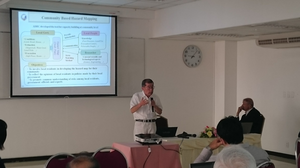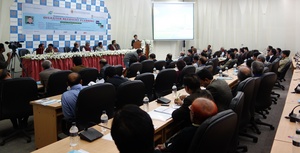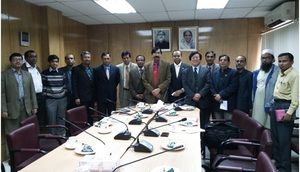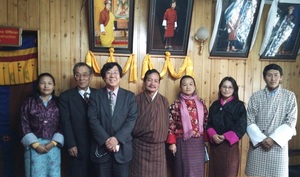Activity Report: Area & Country >> Bangladesh
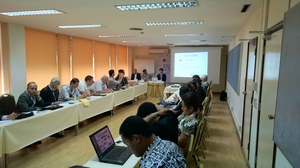
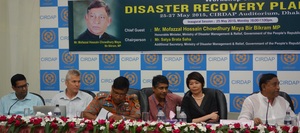
The event gathered over 50 high level and technical delegations from various ministries of the government, universities, development partner organizations, NGOs, and private sector to achieve to discuss recovery agenda in the context of the Sendai Framework for Disaster Risk Reduction. The event was inaugurated by Mr. Mofazzal Hossain Chowdhury Maya Bir Bikram, Minister for Disaster Management and Relief (MoDMR) of the People's Republic of Bangladesh, who expressed commitment to pursue effective disaster management programs by incorporating 'build back better'. At the closing, Mr. Hasanul Haq Inu, Minister for Information, assured the participants that build back better efforts in recovery, rehabilitation, and reconstruction will be advocated in Bangladesh through the support of the ministry and media organizations.
One of the workshop outcomes was the identification of recovery issues, where the participants came up with initial strategies and actions to be integrated in the Pre-Disaster Recovery Plan of Bangladesh. On the bases of the workshop outcomes, the following next steps were identified. Firstly, a parliamentary meeting on 'build back better' will be organized on June 16, 2015 at the Bangladesh Parliament to discuss disaster risk reduction and recovery issues that require legal support and legislation. Secondly, the MoDMR through the support of UNDP Bangladesh will take forward the initial strategies and actions for Pre-Disaster Recovery Plan by organizing a writeshop on the first week of August 2015. Thirdly, through coordination between MoDMR and BBBF, the list of recovery agendas shall be advocated in existing policy and planning instruments in Bangladesh, including the Delta Plan that is facilitated by the Ministry of Planning. Fourthly, under the auspices of MoDMR, the BBBF shall take further steps to advocate in linking up key stakeholders in Bangladesh so that the Inter-Ministerial Disaster Coordinating Council (IMDCC) is convened and recovery agenda is integrated in the plans. Finally, new programs and projects to promote build back better shall be proposed by BBBF in collaboration with MoDMR and other relevant stakeholders. The initial proposals include building critical mass of local recovery experts and volunteers and partnership between local universities and international knowledge hubs to promote recovery agenda in school curricula as well as facilitate knowledge-sharing and exchange.
9-10 December 2014 (Dhaka, Bangladesh)
Considering that "disasters are inevitable in Bangladesh due to its high vulnerability index", the Government, specifically the Ministry of Disaster Management and Relief (MoDMR), recognized the need for strategic options to further reduce the impacts of disaster. The principle of "build back better" is one particular option that the Government wants to promote by seizing the opportunity to correct the limitations and failures of previous practices, policies, and programs during the recovery phase. It further recognized that recovery offers opportunity to make infrastructures, communities, and livelihoods resilient.
In view of this, the MoDMR, in cooperation with the Institute of Strategic Recovery Studies for Disaster Resilience and Research (ISRSDRR) and the Interational Recovery Platform/Asian Disaster Reduction Center (IRP/ADRC), had jointly organized a Stakeholders Consultation Workshop on Disaster Recovery Planning, 9-10 December 2014 at CIRDAP Auditorium in Dhaka, Bangladesh. The workshop was supported by local partners, namely: UNDP, Australian Aid, Islamic Relief, and Christian Aid.
Participated by over 50 stakeholder representatives, the consultation was generally aimed at creating the foundation for promoting resilient recovery and paving the way for sustainable development in Bangladesh. Specifically, the consultation was expected to achieve the following: (i) introduced recovery agenda to key stakeholders, (ii) prepared the ground works for establishing a National Recovery Platform, and (iii) discussed and endorsed a Roadmap for Disaster Recovery Planning.
At the opening, IRP/ADRC delivered the keynote speech which introduced the key principles of disaster recovery, including knowledge products, case studies, tools, and guidance. After the keynote, the following key officials from the Government delivered their respective speeches: Mr. Mohammed Abdul Wazed, Director-General of the Department of Disaster Management; Dr. Mesbah ul Alam, Secretary of the Ministry of Disaster Management and Relief; Hon. Mofazzal Hossain Chowdhury Maya Bir Bikram, Minister of Disaster Management and Relief; and Mr. Dhirendra Debnath Shambhuh, Member of Parliament and Chairman of the Parliamentary Standing Committee on Disaster Risk Reduction. The key message of all the speeches was that recovery is gap in disaster risk reduction (DRR) that Bangladesh needs to address.
At the end of the workshop, the stakeholders identified the following key recommendations: (i) institutionalization of recovery functions at the national and local governments; (ii) establishment of predictable funding for recovery at the government agencies; (iii) adoption of mechanisms for cooperation in areas of recovery; and (iv) formulation of disaster recovery framework for readiness and capacity. As way forward, the Ministry of Disaster Management and Relief laid the ground works for establishing the National Recovery Platform with further consultations with key stakeholders, including UNDP, Islamic Relief, Christian, ISRSDRR, and IRP/ADRC.
(2014/12/17 14:40)
5-10 December 2010 (Ulaanbaatar, Mongolia)
12-16 December 2010 (Dhaka and Noakhali, Bangladesh)
Since 2009, ADRC has initiated a pilot project of ADRC Peer Review with the aim of developing DRR capacity of ADRC member countries by sharing information and strengthening the relationship among member countries. This year Mongolia and Bangladesh were selected as target countries among applications from ADRC member countries. After the submission of country reports by the two target countries, reviewer teams, which consist of two officers from member countries, one expert from Japan and one or two from ADRC per a target country, have visited target countries to conduct interview surveys.
<Mongolia>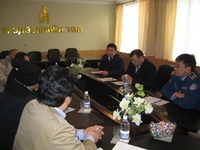 On 5-10 December 2010, the ADRC reviewer team, composed of Prof. Masato Motosaka (Earthquake Disaster Research Laboratory, Disaster Control Research Center, Graduate School of Engineering, Tohoku University), Mr. Tshering Kezang (Governor, Dzongkhag Administration, Lhuentse, Bhutan), Mr. Vizesh Rana (Deputy Commandant, Ministry of Home Affairs, India) and two ADRC staff members visited Ulaanbaatar, Mongolia. During the four day survey, the team visited various ministries and institutions related to DRR activities, including NEMA: National Emergency Management Agency (ADRC's counterpart in Mongolia), to examine how they have been making the efforts for earthquake disaster education and capacity development by government and non-governmental organizations in Mongolia. Then, the team conducted on-site review of the building condition, and prepared a draft report of the survey result with all findings and recommendations. On the last day of the survey, a workshop was held for getting opinion and comments to finalize the report and attended by about 30 NEMA officials. The representative from Bhutan and India also made presentations on their efforts for earthquake disaster reduction in the workshop. It provided a very good opportunity for exchanging opinions each other.
On 5-10 December 2010, the ADRC reviewer team, composed of Prof. Masato Motosaka (Earthquake Disaster Research Laboratory, Disaster Control Research Center, Graduate School of Engineering, Tohoku University), Mr. Tshering Kezang (Governor, Dzongkhag Administration, Lhuentse, Bhutan), Mr. Vizesh Rana (Deputy Commandant, Ministry of Home Affairs, India) and two ADRC staff members visited Ulaanbaatar, Mongolia. During the four day survey, the team visited various ministries and institutions related to DRR activities, including NEMA: National Emergency Management Agency (ADRC's counterpart in Mongolia), to examine how they have been making the efforts for earthquake disaster education and capacity development by government and non-governmental organizations in Mongolia. Then, the team conducted on-site review of the building condition, and prepared a draft report of the survey result with all findings and recommendations. On the last day of the survey, a workshop was held for getting opinion and comments to finalize the report and attended by about 30 NEMA officials. The representative from Bhutan and India also made presentations on their efforts for earthquake disaster reduction in the workshop. It provided a very good opportunity for exchanging opinions each other.
<Bangladesh>
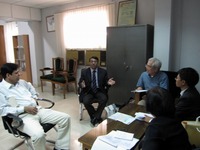 Another reviewer team composed of Dr. Taiichi Hayashi of Research Center for Fluvial and Coastal Disasters of Disaster Prevention Research Institute of Kyoto University, Mr. San Kung from Myanmar's Relief and Resettlement Department, Ministry of Social Welfare, Relief and Resettlement, Ms. Crispina B. Abat of Philippines' Office of Civil Defense, and Ms. Yumi Shiomi of ADRC visited Bangladesh on 12-16 December 2010 to conduct a survey for learning about their ongoing efforts for Cyclone Preparedness in the country. The survey began with visiting relevant organizations in Dhaka such as Disaster Management and Relief Division of Ministry of Food and Disaster Management (ADRC's counterpart in Bangladesh), its Disaster Management Bureau, Bangladesh Meteorological Department, Bangladesh Water Development Board, Institute of Water Modeling and Bangladesh Red Crescent Society. Then the team moved to cyclone-prone Noakhali District in the coastal region to learn the situations through interviewing local DRM officials, volunteers and residents, and visiting cyclone shelters and embankments. The team members with cyclone expertise and experiences of severe storm countermeasures in their countries actively shared opinions during the survey.
Another reviewer team composed of Dr. Taiichi Hayashi of Research Center for Fluvial and Coastal Disasters of Disaster Prevention Research Institute of Kyoto University, Mr. San Kung from Myanmar's Relief and Resettlement Department, Ministry of Social Welfare, Relief and Resettlement, Ms. Crispina B. Abat of Philippines' Office of Civil Defense, and Ms. Yumi Shiomi of ADRC visited Bangladesh on 12-16 December 2010 to conduct a survey for learning about their ongoing efforts for Cyclone Preparedness in the country. The survey began with visiting relevant organizations in Dhaka such as Disaster Management and Relief Division of Ministry of Food and Disaster Management (ADRC's counterpart in Bangladesh), its Disaster Management Bureau, Bangladesh Meteorological Department, Bangladesh Water Development Board, Institute of Water Modeling and Bangladesh Red Crescent Society. Then the team moved to cyclone-prone Noakhali District in the coastal region to learn the situations through interviewing local DRM officials, volunteers and residents, and visiting cyclone shelters and embankments. The team members with cyclone expertise and experiences of severe storm countermeasures in their countries actively shared opinions during the survey.
This project aims at developing the mutual learning process among the ADRC member countries instead of one-way learning. After the survey missions, reviewer teams will compile survey reports and send them to target countries and then to ADRC member countries to enhance cross-fertilization.
ADRC would like to express its sincerest gratitude to all of those who have made precious contribution to this project this year.
(2010/12/21 17:40)
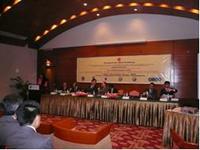 The 4th ERRP Regional Workshop was held in Dhaka on 10-12 Decmber 2009. The participants from each ERRP country exchanged of their opinions actively in the general workshop and also group formation/ discussions in parallel sessions concerning about the technical / financing/ monitoring and evaluation. On the last day of the Workshop, we visited Mirpur Training Center, Fire Service and Civil Defense and observed the fire drill at earthquake time. Flood disaster prevention is the major disaster management in Bangladesh, but felt enthusiasm to wrestle with earthquake disaster prevention more positively. At the end, it is requested from ADRC to make the best use of the results of last 2 years' ERRP activities in each member country and to develop ERRP further at each country level continuously in future.
The 4th ERRP Regional Workshop was held in Dhaka on 10-12 Decmber 2009. The participants from each ERRP country exchanged of their opinions actively in the general workshop and also group formation/ discussions in parallel sessions concerning about the technical / financing/ monitoring and evaluation. On the last day of the Workshop, we visited Mirpur Training Center, Fire Service and Civil Defense and observed the fire drill at earthquake time. Flood disaster prevention is the major disaster management in Bangladesh, but felt enthusiasm to wrestle with earthquake disaster prevention more positively. At the end, it is requested from ADRC to make the best use of the results of last 2 years' ERRP activities in each member country and to develop ERRP further at each country level continuously in future.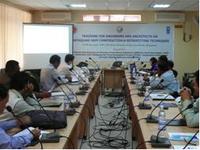 In addition, ADRC carried out the guidance of the technical assistance service on 7-8 December 2009 at Rangamati Municipality ( from Chittagong to north-east for about three hours by car). We conducted the training about "Earthquake safe construction of Masonry Building" and "Quality Management of Reinforced Concrete Building" to the thirty local engineers stationed in Rangamati Municipality, then we visited several construction sites to observe the defects and also the counter measures with exchanging the technical opinions between us. This technical assistance service had been successfully completed.
In addition, ADRC carried out the guidance of the technical assistance service on 7-8 December 2009 at Rangamati Municipality ( from Chittagong to north-east for about three hours by car). We conducted the training about "Earthquake safe construction of Masonry Building" and "Quality Management of Reinforced Concrete Building" to the thirty local engineers stationed in Rangamati Municipality, then we visited several construction sites to observe the defects and also the counter measures with exchanging the technical opinions between us. This technical assistance service had been successfully completed.28 February - 19 March 2009 (Dhaka, Bangladesh)
JICA (Japan International Cooperation Agency) started the survey to formulate the comprehensive support program for Bangladesh where it has suffered many natural hazards. The program may include some yes-loan-financed projects. The survey focuses on water management including flood and cyclone and earthquake management as a sub-sector. Based on the survey, some projects which require urgent implementations would be considered and formulated when necessarily. The duration of the survey mission in Bangladesh is from 28th Feb to 19th March. Koji Suzuki, Executive Director of Asian Disaster Reduction Center participated in the survey mission. The mission visited the Ministry of Food and Disaster Management that is the Bangladesh counterpart government organization of Asian Disaster Reduction Center and Bangladesh Disaster Preparedness Center that Asian Disaster Reduction Center has long been working with. The mission had meetings at Ministry of Water Resource, Dhaka Geophysical Observatory, Dhaka Fire Brigade, BRAC University, Bangladesh University of Engineering & Technology, UNDP and ADB. It also made some filed surveys on construction sites in Dhaka guided by Public Works Department and some river sites.
(2009/03/12 13:10)


